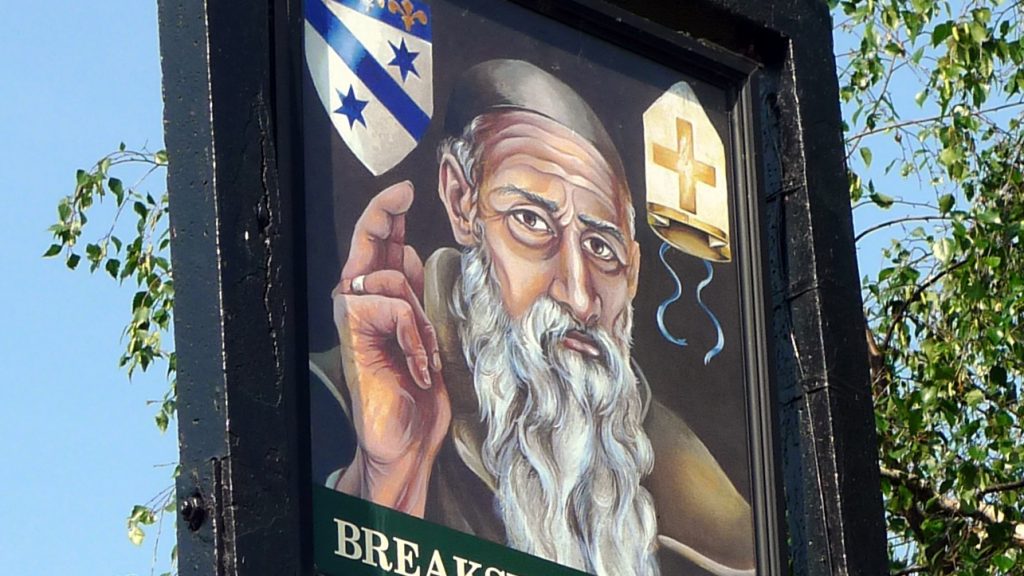Today in 1154, Nicholas Breakspear, an Englishman from a lowly background, was elected Pope Adrian IV in Rome. The only English Pope ever (as celebrated in an English pub sign above), he had been something of a globetrotting cardinal with the reputation of fixing problems, which may explain why he was elected by a unanimous vote of his fellow cardinals. When he resisted the vote result, the cardinals shouted, ‘Pope Adrian, elected by God!’ until he agreed. During his reign, the controversial title ‘Vicar of Christ’ for Popes came into popular use.
It is the feast of the Eastern theologian and monk St John of Damascus. St John, who died today in the year 749 at his monastery near the Dead Sea, led the opposition to the campaign by the Byzantine Emperor Leo III to rid the Church of icons. Ironically, John was able to write openly against the Emperor, a fellow Christian, because his location in Palestine meant he was living under the protection of an Islamic ruler, where the Emperor could not harm him.
‘It is obvious that when you contemplate God becoming man, then you may depict him clothed in human form. When the invisible one becomes visible to flesh, you may then draw his likeness. When he who is bodiless and without form empties himself and takes the form of a servant, then you may draw his image and show it to anyone willing to gaze upon it.’ St John of Damascus, On the Divine Images
Today in 1619, 38 English settlers, sailing on the Margaret, a ship from Bristol, England, arrived at Berkeley Hundred in the Colony of Virginia. ‘The day of our ship’s arrival’, they agreed, ‘shall be yearly and perpetually kept as a day of Thanksgiving’. The Berkeley colonists were two years ahead of the Mayflower colonists in establishing Thanksgiving.
John XXII, the powerful French Pope who ruled from Avignon, died today in 1334. John attacked the Rule of St Francis by saying it was not true that Christ and the disciples lived in complete poverty, owning nothing either individually or together. He also set in motion the Church’s persecution of witchcraft, possibly because he was the target of an assassination attempt using poison and sorcery. He issued a bull, Super illius specula (‘Upon his watchtower’), which declared witchcraft to be heresy, and set a policy for witches to be tried by the Inquisition. These dark themes consume the characters in Umberto Eco’s famous novel The Name of the Rose, which is set in the middle of his reign. It was more than 600 years before any other Pope took the name John (in 1958).
‘They sacrifice to demons and adore them, they make or cause to be made images, rings, mirrors, phials or some such things in which by the art of magic evil spirits are to be enclosed. From them they seek and receive replies, and ask aid in satisfying their evil desires. For a foul purpose they submit to the foulest slavery. Alas! this deadly malady is increasing more than usual in the world and inflicting greater and greater ravages on the flock of Christ.’ Super illius specula, 1326
Nicholas Ferrar, the founder of the Anglican community of Little Gidding, died today in 1637. The community was formed when the members of his extended family, including Ferrar’s mother, siblings and their children, quit London during a plague in 1625, and moved into a manor house in the virtually abandoned village of Little Gidding in Huntingdonshire, England. Their almost monastic life was devoted to the Book of Common Prayer, and it was quirkily Puritan – they addressed each other using names such as Cheerfull, Goodwife, Obedient, and Visitor. Little Gidding lends its name to the final poem of the Four Quartets by TS Eliot.
You are here to kneel
Where prayer has been valid. And prayer is more
Than an order of words, the conscious occupation
Of the praying mind, or the sound of the voice praying.
And what the dead had no speech for, when living,
They can tell you, being dead: the communication
Of the dead is tongued with fire beyond the language of the living.
TS Eliot, Four Quartets, ‘Little Gidding’
Image: Ewan-M / CC BY-SA 2.0
